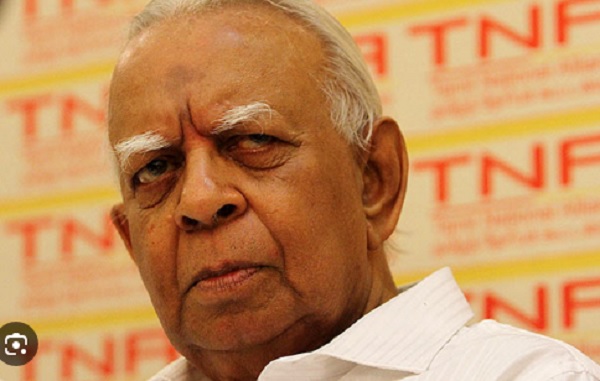Colombo, July 01, 2024 – The death of Rajavarothiam Sampanthan, a leading figure in Sri Lankan Tamil politics, has sparked a renewed debate over his controversial legacy, particularly regarding allegations of double standards in his political stance. While Sampanthan is lauded for his efforts to secure Tamil rights, critics argue that his inconsistent positions have left a mixed legacy.
Sampanthan, who served as the leader of the Tamil National Alliance (TNA), was a prominent advocate for Tamil autonomy and reconciliation in Sri Lanka. However, his approach has often been criticized for what some perceive as double standards, especially in his dealings with both the Tamil community and the Sri Lankan government.
Champion of Tamil Rights
Sampanthan’s career was marked by his unwavering dedication to Tamil rights. He was instrumental in pushing for federalism and greater autonomy for Tamil-majority areas in the North and East of Sri Lanka. His leadership during the civil war and in its aftermath was seen as a crucial voice for the Tamil minority, advocating for justice, equality, and recognition within a unified Sri Lankan state.
Accusations of Double Standards
However, Sampanthan’s critics accuse him of adopting a dual approach that often appeared contradictory. On one hand, he advocated for Tamil self-determination and criticized the government’s military actions during the civil war. On the other hand, he engaged in dialogue with successive Sri Lankan governments, which some viewed as overly conciliatory and compromising on core Tamil demands.
Engagement with the Government: Sampanthan’s willingness to negotiate with the government, particularly after the end of the civil war in 2009, drew ire from hardline Tamil factions. They argued that his approach failed to hold the government accountable for alleged war crimes and did not secure meaningful autonomy for the Tamil regions. Critics saw his participation in parliamentary politics as a tacit endorsement of the status quo.
Inconsistent Messaging: At times, Sampanthan’s public statements appeared to shift depending on the audience. While he championed Tamil rights in domestic and international forums, his readiness to participate in government-led initiatives was seen as a contradictory stance, leading to accusations of inconsistency. This duality alienated some supporters who felt he did not adequately represent the more radical demands of the Tamil struggle.
A Divisive Legacy
Sampanthan’s dual approach has left a complex legacy. Supporters argue that his pragmatic politics were necessary for achieving any progress in a highly polarized environment. They believe his efforts at negotiation and compromise were steps towards a peaceful and sustainable resolution to the ethnic conflict.
Conversely, detractors maintain that his actions often fell short of the expectations of the Tamil community. They contend that his double standards weakened the Tamil political position and diluted the push for true autonomy and justice for war-affected Tamils.
Reactions to His Passing
In the wake of his death, reactions have been mixed. Many Tamil leaders have expressed their respect for Sampanthan’s lifelong dedication to Tamil causes, while also acknowledging the contentious aspects of his political strategy. “Sampanthan’s contributions to Tamil politics are undeniable, but we must also reflect on the compromises that may have hindered our progress,” said a prominent Tamil activist.
Sri Lankan President Ranil Wickremesinghe paid tribute to Sampanthan, highlighting his role in bridging divides and working towards reconciliation. “R. Sampanthan was a complex figure whose efforts to balance diverse demands were both his strength and his challenge,” the President remarked. As the Tamil community and Sri Lanka at large reflect on Sampanthan’s life and legacy, the debate over his double standards will continue to shape discussions about the future direction of Tamil politics and the broader quest for national reconciliation.


